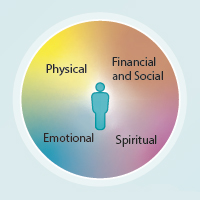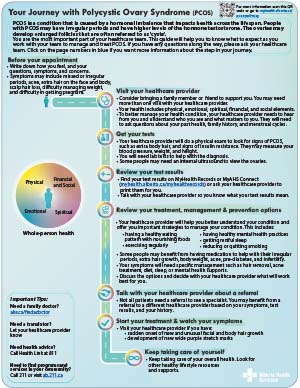This guide will help you to know what to expect as you work with your healthcare team to manage and treat polycystic ovary syndrome (PCOS).
You will have your own unique journey with PCOS. How you move through your journey, the number of visits with your healthcare team, the steps you will take, and the order you take them in will depend on your needs. You will make decisions in partnership with your healthcare team. Always follow your healthcare team’s advice.
What is PCOS?
PCOS is a common condition that is caused by a hormonal imbalance. Hormones control the activity of different cells and organs in your body. With PCOS, the hormone imbalance can affect your period and your overall health. It causes the ovaries to produce higher levels of the hormone testosterone. With PCOS, your ovaries may also develop enlarged, fluid-filled
follicles that are often referred to as cysts.
Because of the extra testosterone, people with PCOS may have:
- missed periods, irregular periods, and very light periods (including spotting)
- extra hair on the face or body
- thinning hair on the head
- severe acne
- difficulty managing weight
- difficulty getting pregnant
- darkening of skin on the neck, armpits, or groin area
If you notice sudden, unusual hair growth on your face or body or new wide purple stretch marks on your body, contact your healthcare provider right away.
You may also have symptoms of:
-
sleep apnea
- fatigue
- anxiety, depression, and mood changes
- high blood pressure, high blood glucose, and high blood lipids (your healthcare team can test for these things)
People living with PCOS may be at an increased risk of sleep apnea, diabetes, heart disease, pregnancy complications, and
endometrial hyperplasia.
Whole-person health
The whole-person health approach will help you and your healthcare team better manage your health condition.

Whole-person health draws from the teachings of the medicine wheel. It means thinking about all parts of your health and wellness:
- physical
- financial and social
- spiritual
- emotional
These parts are all connected and impact each other. It’s important to be aware of your personal needs in each part and to share that information with your healthcare team. Your healthcare team needs to understand who you are and what matters to you.
Support and resources
- If you need a family doctor, visit Alberta Health Services:
Find a doctor.
- If you need a translator, let your healthcare provider know.
- If you need health advice any time, day or night, call Health Link at 811.
- If you need to find programs and services in your community, call or text 211 or visit
211 Alberta.
For more information about PCOS, see:

Polycystic Ovary Syndrome (PCOS) Pathway
Download or print the
full patient pathway (PDF) and
summary (one-page PDF) to learn more about how to manage and treat PCOS.
Patient Pathway  Summary
Summary 
